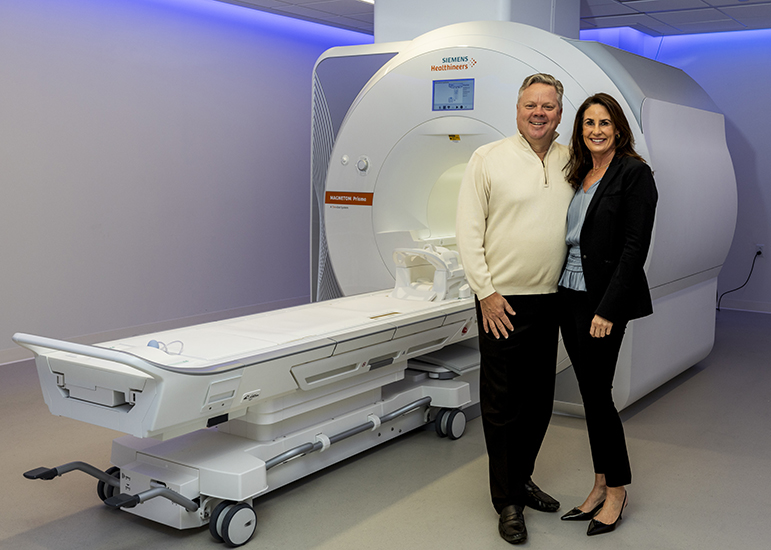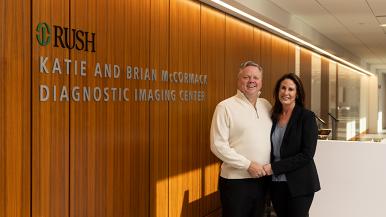A positive patient experience — coupled with a deep commitment to advancing understanding of mental health conditions — inspired Rush University Medical Center Trustee Brian McCormack and his wife, Katie, to make a multimillion-dollar gift that is fueling the future of imaging research at Rush.
“Our family is very focused on mental health,” Brian said. “As we’ve become more open about our own mental health issues, we’ve learned that they affect almost every family. So while it’s a daunting task — and one a lot of people are trying to tackle — we want to do our part to find a way to be proactive and at a place where we can make a significant positive impact.”
MRI scanners and other advanced imaging tools have become critical to scientific discovery, especially as it relates to the brain and spine. Yet such tools are widely used for patient care, so without a dedicated imaging research facility, it is challenging for investigators to carry out their work efficiently.
To meet this need, the McCormacks established the Katie and Brian McCormack Diagnostic Imaging Center. Located on the fifth floor of the Joan and Paul Rubschlager Building, the center offers Rush’s researchers increased access to imaging technology, including a 3.0 Tesla Human MRI Scanner — today’s industry standard for high-caliber imaging research and the most advanced of its kind in Chicago. The scanner has a state-of-the-art platform that accommodates the growing number of machine learning applications in radiology.
“The McCormack family’s gift is transformative for high-visibility, high-impact imaging research at Rush,” said Konstantinos Arfanakis, PhD, professor of diagnostic radiology and nuclear medicine. “It provides top-of-the-line MRI imaging capabilities that will take our work to the next level. The number of lives that will be affected directly and indirectly through the discoveries this Center will support is simply incalculable.”
As a core resource for imaging studies, the center allows researchers to scale up studies that are enhancing our understanding of brain and bodily activity.
“This will give us a better line of sight into the brains of people with mental health disorders, so we can really see what’s going on and work from there,” Brian said. “Beyond that, we want to help researchers see, on a more detailed level, what the brain looks like — for everybody, not just for people with mental health issues. This felt like the right avenue for us to start allocating our philanthropy.”
Compelled by a 'miraculous' patient experience
In early April 2021, Brian was admitted to the intensive care unit at Rush with COVID-19. He was hospitalized for nearly two weeks, and — due to pandemic-related visitor restrictions in place at the time — Katie was unable to be there with him.
“The doctors and nurses were there with me to hold my hand and help me with my breathing during one of the most traumatic moments of my life,” Brian said. “I don’t know how to put into words just how much that meant.”

Brian notes that Rush’s preparation for and response to the COVID-19 pandemic serve as “an unbelievable testament” to the work it does.
“The care I had at Rush — from beginning to end — was nothing short of miraculous,” he said. “There’s an X-factor at Rush. The care teams take that extra bit of time to really understand what’s going on.”
As a trustee, Brian has also had the opportunity to meet with leaders at Rush, including Dr. Omar Lateef, president and CEO of Rush University System for Health and Rush University Medical Center.
“Dr. Lateef makes you strive to be better,” Brian said. “His work ethic and attention to overseeing so many different things at once is remarkable. And importantly, while managing this large organization, he still finds the time to focus on individuals.”
Pilot grants propel innovative imaging research
Brian and Katie’s gift also funds the McCormack Family Imaging Research Awards, a pilot grants program that supports faculty recipients with time to dedicate to their research and 20 hours of free MRI scans.
This year’s awardees include Kristen Haut, PhD, in the Department of Psychiatry and Behavioral Sciences; John Martin, PhD, in the Department of Orthopedic Surgery; Joan O’Keefe, PhD, in the Department of Anatomy and Cell Biology; Dino Samartzis, DSc, in the Department of Orthopedic Surgery; and Vincent Traynelis, MD, in the Department of Neurosurgery.
Dr. Martin’s research project will use the new scanner to measure spinal flexibility in scoliosis patients. A condition with no clear cause or cure, scoliosis can progress to the point where children risk heart or lung dysfunction. Despite interventions, a small proportion of children will have spinal curvature that progresses and requires surgery. With this new technology, Dr. Martin hopes to better predict spinal curve progression, allowing for early intervention and better outcomes for all children.
Dr. O’Keefe’s study is examining Fragile X-associated tremor/ataxia syndrome, or FXTAS, a genetic neurodegenerative disorder where brain cells die over time, leading to tremor, imbalance and cognitive decline. Through her imaging research, O’Keefe seeks to translate understanding of the structural and functional neural underpinnings of cognitive and motor impairments in FXTAS into new interventions to prevent falls and improve mobility and quality of life for patients and their caregivers.
Dr. Samartzis’ research will use the new imaging technology to better understand spine degeneration and pain, leading to the development of more personalized medical treatments for patients. The project will also lay the foundation for larger-scale funding.
Dr. Traynelis will use the new Imaging Center at Rush to examine new magnetic resonance imaging protocols designed to accurately determine blood flow to the spinal cord. This will offer a non-invasive approach to help improve recovery among patients with spinal cord injuries.




